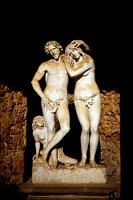 http://catholica.pontifications.net/
http://catholica.pontifications.net/by Alvin Kimel
I have just started reading Theology of the Body for Beginners by Christopher West. The title hooked me immediately. Two years ago I tried to read John Paul II’s catechetical lectures on his theology of the body, and I didn’t make it very far. What a relief, therefore, to find someone willing to translate his thought for beginners like myself. I thought that I would share the highlight’s of West’s book, one chapter each day (hopefully).
The theology of the body, West says, can be summarized in the following thesis statement of John Paul:
The body, in fact, and it alone, is capable of making visible what is invisible: the spiritual and divine. It was created to transfer into the visible reality of the world, the mystery hidden since time immemorial in God, and thus to be a sign of it. (p. 5)
This is a bold statement. All of created reality can be understood as a sacrament of the divine; but the human body simultaneously reveals to us both the mystery of human existence and the mystery of God. Inscribed in our bodies is our vocation to love as God loves. We are made male and female and called to fruitful communion. Through this union of man and woman, the Pope declares, we rediscover “the meaning of the whole of existence, the meaning of life” (p. 2).
God is Holy Trinity. In the words of the Catholic Catechism: “God has revealed his innermost secret: God himself is an eternal exchange of love.” The Father eternally communicates himself to the Son, and the Son eternally receives the love of the Father and gives himself to the Father in reciprocal love. And the love they share is the Holy Spirit. From the heart of this community of love flows the decision to create persons to share in the divine ecstasy of the Father, Son, and Holy Spirit. Humanity, male and female, reflects and images the divine mystery:
So, once again, when we speak of the invisible ‘mystery hidden in God from time immemorial’ we are speaking of the fact that (1) God is a communion of love and (2) we are destined to share in that exchange. This two-part “mystery” is what the human body signifies right from the moment of our creation. How so? Precisely through the beauty and mystery of sexual difference and our call to become “one flesh” (see Gn 2:24).
God imprinted in our sexuality the call to participate in a “created version” of his eternal “exchange of love.” In other words, God created us male and female so that we could image his love by becoming a sincere gift to each other. This sincere giving establishes a “communion of persons” not only between the sexes but also—in the normal course of events—with a “third” who proceeds from them both. In this way, sexual love becomes an icon or earthly image in some sense of the inner life of the Trinity. (pp. 8-9)
The love of man and woman also reveals the the union of God with humanity in Jesus Christ. The key biblical text for John Paul is Ephesians 5:31-32:
“For this reason a man shall leave his father and mother and be joined to his wife, and the two shall become one flesh.” This is a great mystery, and I mean in reference to Christ and the church.
The holy communion of husband and wife “foreshadows the Holy Communion of Christ and the Church” (p. 9). John Paul even speaks of the Holy Eucharist as “the sacrament of the Bridegroom and of the Bride” (p. 9). West shares the story of his father-in-law who attended Mass the day after his wedding, having consummated his marriage the night before. He returned to his pew in tears. When his wife asked him if anything was wrong, he replied, “For the first time in my life I understood the meaning of Christ’s words, ‘This is my body given for you’” (p. 10).
I have known such a moment in intimate union with my beloved.
John Paul is thus willing to speak of the nuptial union as the least inadequate human analogy to the mystery of the Holy Trinity: “In this entire world there is not a more perfect, more complete image of God, Unity and Communion. There is no other human reality which corresponds more, humanly speaking, to that divine mystery” (p. 12).
Is the Song of Songs the very heart of the Bible?
Given the iconic significance of the nuptial union, is it surprising that the Enemy should attack humanity precisely at this point? The last thing the Devil wants is for us to discern the mystery of God in our bodies.


2 comments:
Thank you for the Christopher West piece. If only one could start all over again.
This is beautiful, I didn't realise the old pope said such wonderful things
Post a Comment